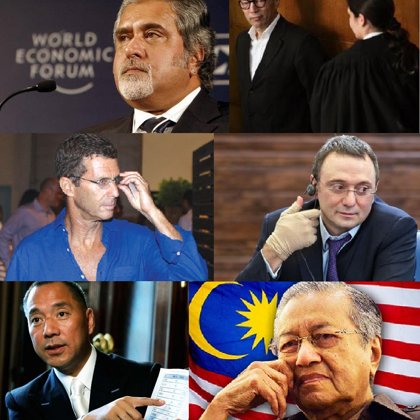GLOBAL INVESTIGATIONS AGAINST MONEY LAUNDERING IN CHINA,MALAYSIA, INDIA , ISRAEL.YOUNG BILLIONAIRES ,YOU CANNOT BECOME BILLIONAIRES FROM SUPPOSEDLY NOTHING IN JUST FEW YEARS,UNLESS YOU ARE DOING SOMETHING ILLEGAL.BEHIND EVERY GREAT FORTUNE LIES A GREAT CRIME
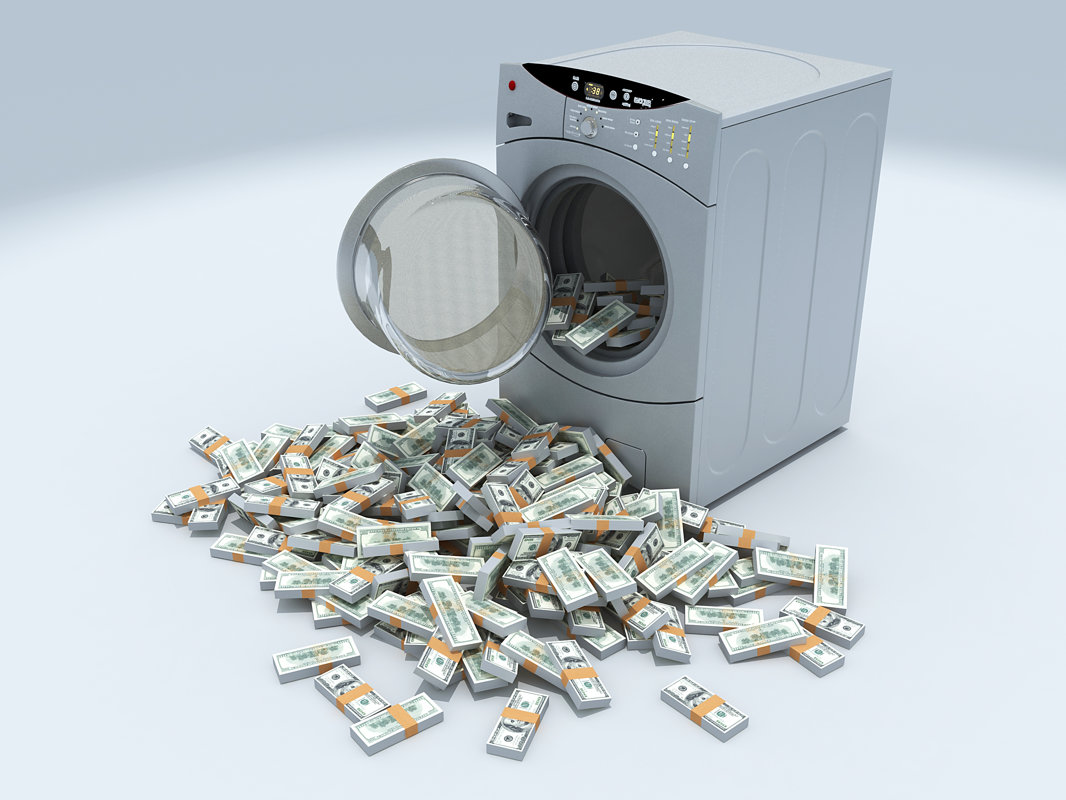 Money laundering is the generic term used to describe the process by
which criminals disguise the original ownership and control of the
proceeds of criminal conduct by making such proceeds appear to have
derived from a legitimate source.The Panama Papers are an unprecedented leak of 11.5m files from the
database of the world’s fourth biggest offshore law firm, Mossack
Fonseca.The documents show the myriad ways in which the rich can exploit secretive offshore tax regimes.
Money laundering is the generic term used to describe the process by
which criminals disguise the original ownership and control of the
proceeds of criminal conduct by making such proceeds appear to have
derived from a legitimate source.The Panama Papers are an unprecedented leak of 11.5m files from the
database of the world’s fourth biggest offshore law firm, Mossack
Fonseca.The documents show the myriad ways in which the rich can exploit secretive offshore tax regimes.
Money laundering happens in almost every country in the world, and a single scheme typically involves transferring money through several countries in order to obscure its origins. In this article, we'll learn exactly what money laundering is and why it's necessary, who launders money and how they do it and what steps the authorities are taking to try to foil money-laundering operations.Money laundering, at its simplest, is the act of making money that comes from Source A look like it comes from Source B. In practice, criminals are trying to disguise the origins of money obtained through illegal activities so it looks like it was obtained from legal sources. Otherwise, they can't use the money because it would connect them to the criminal activity, and law-enforcement officials would seize it.China isn't the only country with capital flight problems. Russia is in second place with US$880-billion in illicit capital flows between 2002 and 2011. But whatever the source, Canada must stop being naïve and aiding and abetting such crimes.The secret insider terms used in Chinese money laundering.The term “anticorruption” has been at the forefront of Chinese president Xi Jinping’s rule. His housecleaning campaign has targeted (paywall) Central Committee and Politburo members, political rivals and powerful tycoons. And as China’s National People’s Congress removes restrictions on presidential terms, it is also expected to shore up Xi’s power by creating an independent anti-corruption agency. But China’s corruption problem extends well beyond its borders.Nearly two percent of China’s GDP may have been lost to capital flight in the first three quarters of 2017, according to the US Federal Reserve . And offshore tax havens have proven incredibly popular destinations for those stolen funds: Mossack Fonseca, the offshore law firm behind the Panama Papers leak, found a third of its work in China and Hong Kong.International money laundering is so pervasive that two telling phrases have reportedly entered the Chinese lexicon: “BVI” and “White Gloves.” Both reflect the global nature of kleptocracy, with Western actors and countries profiting off money moved from developing countries.None of these visas are restricted to Chinese nationals. However, China’s the place to find nouveau riche these days, and since being introduced, the programs have all been dominated by potential investors from the Middle Kingdom who want out. Chinese citizens made up eight of 10 investor visas issued by the U.S. State Department last year. George Osborne, the British chancellor of the exchequer, declared that the U.K. would focus on making it easier for Chinese investors to enter the country.Canada is going in the opposite direction. It canceled its investment visa earlier this year after the process became overrun by Chinese applicants. It was one of the cheapest routes out of China. The Canadian government said the program significantly undervalued Canadian permanent residency. It also provoked local resentment, as wealthy immigrants bid up property prices in places like Vancouver.But realistically, economic opportunities do not top the list for many émigrés. China’s not an easy place to live. Wealthy Chinese parents are becoming increasingly concerned about raising kids in an environment with filthy air, not to mention a critical lack of clean water and constant food and beverage safety scandals.Calculating prospective parents can also use the visas as a means to obtain foreign nationality for their children, if they’re born abroad. Later, if those children return to China with a foreign passport, they’ll be able to attend international schools, which are off-limits to Chinese nationals. It’s also easier for them to travel and attend university abroad. Unscrupulous businessmen may be looking to escape China with their wealth intact before the government’s current anti-corruption campaign catches up with them.It all sounds a bit mercantile. But if it’s not happiness they’re buying, sounds like they’re still getting a lot for their money.The five men are being questioned by the Israel Police’s Lahav 433 anti-corruption division and Swiss Police about allegations of largescale fraud, breach of trust, bribery, obstruction of justice and false registration of corporate documents.It is suspected that the four men were working with Steinmetz in a systematic way in order to create and present false contracts and deals, mainly in the real estate sphere in foreign countries, in order to transfer money and launder money.Police extended Steinmetz’s and Zilberstein’s detention to four days, but released Granot later in the day and permitted him to return to work.Steinmetz denied every allegation in the court discussion . “I feel awful that the State of Israel is doing this to me. These measures] are common in an authoritarian regime,” he said. “I have done nothing wrong; I was politically targeted.”He also accused billionaire George Soros of targeting him over a personal vendetta involving his business interests in Guinea.
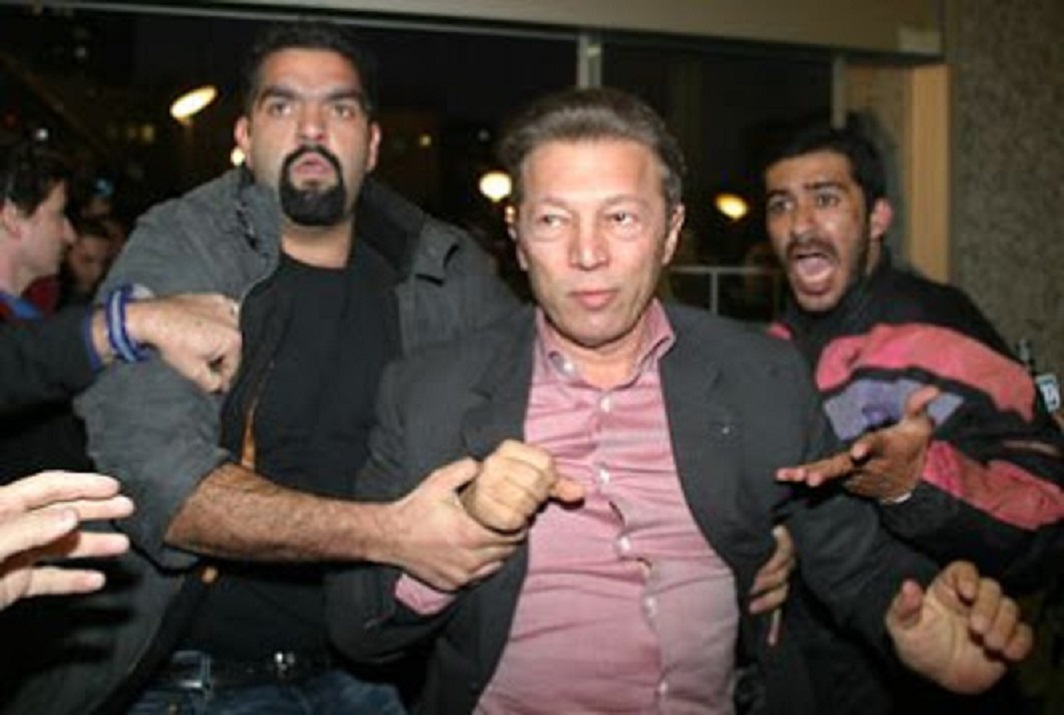 Israeli billionaire Beny Steinmetz and acting Bezeq CEO David Granot were among five individuals detained by police in an international money laundering investigation centering around Steinmetz, a diamond and real estate magnate.Tal Zilberstein, an Israeli political consultant to the Austrian government, attorney Doron Levy, and Asher Avidan, a former senior executive of Steinmetz’s in Guinea and president of BSGR corporation mining division, were also detained.
Israeli billionaire Beny Steinmetz and acting Bezeq CEO David Granot were among five individuals detained by police in an international money laundering investigation centering around Steinmetz, a diamond and real estate magnate.Tal Zilberstein, an Israeli political consultant to the Austrian government, attorney Doron Levy, and Asher Avidan, a former senior executive of Steinmetz’s in Guinea and president of BSGR corporation mining division, were also detained.
How Chinese gangs are laundering drug money through Vancouver real estate.Criminal syndicates that control chemical factories in China’s booming Guangdong province are shipping narcotics, including fentanyl, to Vancouver, washing the drug sales in British Columbia’s casinos and high-priced real estate, and transferring laundered funds back to Chinese factories to repeat this deadly trade cycle, a Global investigation shows.The flow of narcotics and chemical precursors and a rising death count in western Canada caused by synthetic opioids is driven by sophisticated organized crime groups known as Triads. how Chinese criminals exploit “weak links” in global regulation. In one example, Triads deal with the state of North Korea, and Latin American drug cartels, to run a shadow economy based on the trading of narcotics, counterfeit goods, and illegal migrants. Attack On Bank Of China For "Money Laundering" Screams Infighting In Beijing. China Central Television, the state broadcaster, accused Bank of China of “blatantly offering money laundering services. detailed how a bank employee in Guangdong province coached the journalist on how to transfer large sums offshore in an apparent violation of China’s capital control rules. Those regulations allow individuals to send no more than the equivalent of $50,000 a year.Alleged that the bank, one of China’s “Big Four,” fabricated information through its Youhuitong “preferential money transfer” platform. BOC, as the bank is sometimes called, also joined forces with immigration businesses to hide the source of money and send it outside the country. “Regardless of where and how you get your money, we can help you get it out.One branch in Guangdong had already transferred six billion yuan this year, and several branches in Beijing also provided the same service.The report, nearly 20 minutes in length, caused a sensation, and the bank issued a denial on the same day the attack aired, insisting Youhuitong was legal. According to BOC, “deviated from the facts” and had a “biased understanding” of the funds transfer program. Then the bank, intriguingly, took down its own statement and reposted another that did not include the words. Next, the bank filed a statement with the Hong Kong stock exchange charging “media reports” were “not consistent with the actual situation.” The People’s Bank of China, the central bank: “We have noticed the media report about a commercial bank’s cross-border renminbi business and are verifying related facts.”The facts are not that hard to verify. The Guangzhou branch of the People’s Bank of China, to help Beijing internationalize the renminbi, issued pilot licenses for Youhuitong-type services in late 2011 to Bank of China and late 2012 to Citic Bank. The BOC service was supposed to be localized, but as a practical matter bank units across the country referred customers to the Guangzhou branch, effectively making Youhuitong a nationwide business.The billionaire, Guo Wengui, who is in the United States on a tourist visa that expires later this year, is seeking asylum status because his public charges against Chinese officials have made him “a political opponent of the Chinese regime,” Thomas Ragland, a Washington-based lawyer representing him.Asylum — even a pending asylum application would give Mr. Guo more protection because he could stay in the United States while the application was being considered, a process that can take years, Mr. Ragland said.“Asylum offers a level of protection that is different from having a visa status,” Mr. Ragland said. “Visas can be canceled or revoked.”From his $68 million apartment overlooking Central Park in Manhattan, Mr. Guo, also known as Miles Kwok, has used Twitter and YouTube to publicize his claims that Wang Qishan, a member of the elite Politburo Standing Committee who oversees the ruling Communist Party’s own anticorruption efforts, and his family members secretly control one of China’s largest conglomerates.Some of the evidence he presents to back his claims is easily refuted or simply difficult to believe. But some of his accusations, such as those made against the family of Mr. Wang’s immediate predecessor, can be corroborated.Mr. Guo’s actions have earned the ire of the Chinese government. In April Beijing asked Interpol, the global police organization, to issue a global warrant for his arrest. He is also being sued for libel in United States courts by several Chinese individuals and companies.The asylum application could present a diplomatic quandary for the Trump administration, which is seeking China’s help in isolating North Korea after it conducted a series of missile tests and underground nuclear tests. Mr. Guo is arguably China’s most-wanted man, and giving him asylum would almost certainly antagonize Beijing, which may interpret the move as tacit approval of Mr. Guo’s tactics to undermine China’s leadership.Articles in China’s closely controlled news media have accused Mr. Guo of crimes including fraud, money laundering and rape. In April one of his associates, a former vice minister of state security, appeared in a televised confession in which he said Mr. Guo had bribed him.
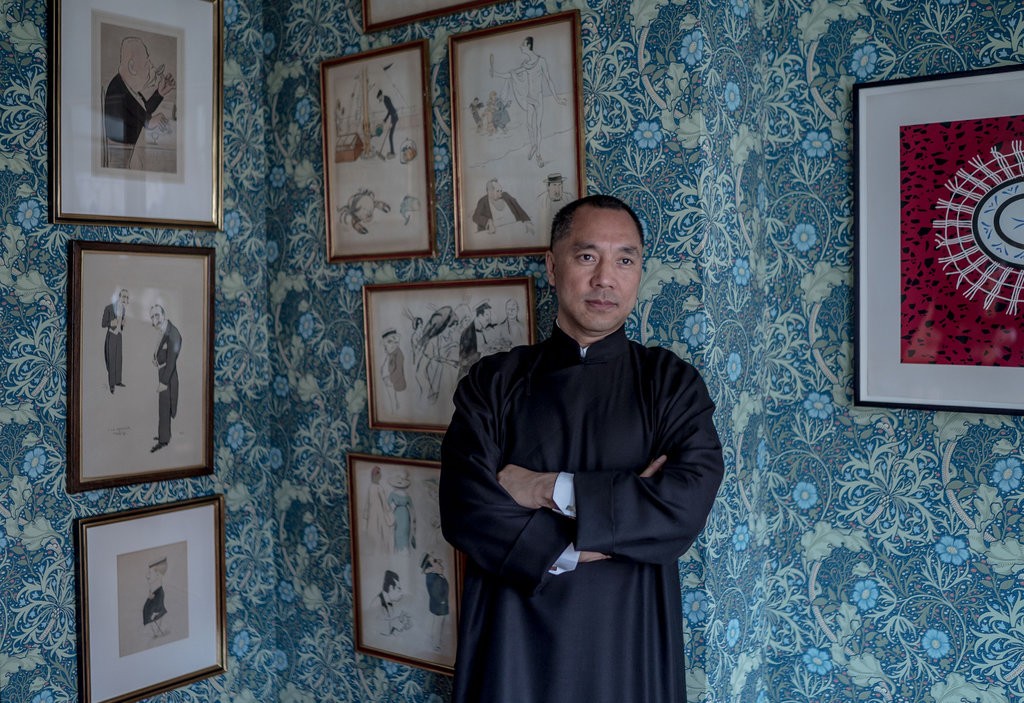 Billionaire who accused top Chinese officials of corruption asks U.S. for Asylum.Guo Wengui, a billionaire property developer, is seeking asylum in the United States because his public charges against Chinese officials have made him “a political opponent of the Chinese regime,” his lawyer said.
Billionaire who accused top Chinese officials of corruption asks U.S. for Asylum.Guo Wengui, a billionaire property developer, is seeking asylum in the United States because his public charges against Chinese officials have made him “a political opponent of the Chinese regime,” his lawyer said.
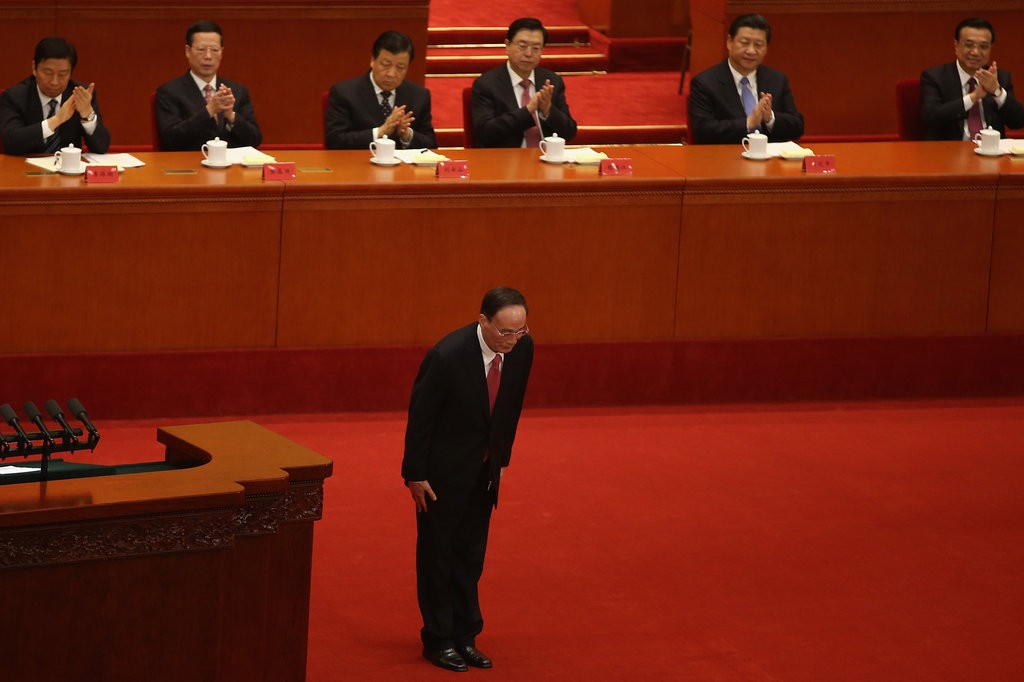 Wang Qishan, a member of China’s elite Politburo Standing Committee whose retirement status will be decided at a Communist Party meeting . Mr. Guo claims that Mr. Wang and his family secretly control one of China’s largest conglomerates.
Wang Qishan, a member of China’s elite Politburo Standing Committee whose retirement status will be decided at a Communist Party meeting . Mr. Guo claims that Mr. Wang and his family secretly control one of China’s largest conglomerates.
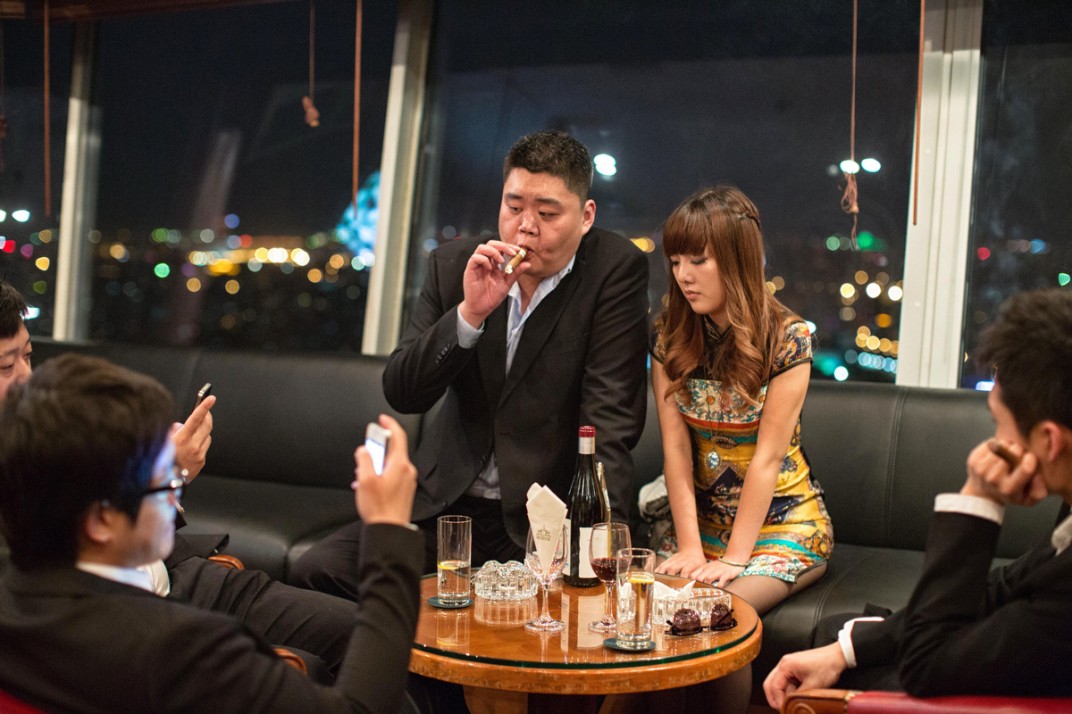
 Rich Chineses migrating to Australia, America en masse.The jury may be out permanently on the old question of if money can buy happiness, but that hasn’t stopped wealthy Chinese families from trying. There is a growing trend among China’s richest to use their wealth to move themselves and their families abroad. This is done primarily in the form of investment visas.On the flip side, a number of countries are opening the doors to the estimated 1 million Chinese millionaires provided they bring their money with them.
Rich Chineses migrating to Australia, America en masse.The jury may be out permanently on the old question of if money can buy happiness, but that hasn’t stopped wealthy Chinese families from trying. There is a growing trend among China’s richest to use their wealth to move themselves and their families abroad. This is done primarily in the form of investment visas.On the flip side, a number of countries are opening the doors to the estimated 1 million Chinese millionaires provided they bring their money with them.
Russia’s primary anti-money laundering (AML) laws and regulations are as follows:the Federal Law on the Prevention of Legalisation (laundering) of the Proceeds of Crime and Terrorist Financing (dated 7 August 2001, No. 115-FZ) (the AML Law), together with numerous accompanying regulatory acts, contains the general framework of the AML compliance regulations,the Criminal Code of the Russian Federation (CC) criminalises the offence of money laundering,the Criminal Procedural Code of the Russian Federation (CPC) provides a comprehensive set of rules of criminal procedure, including international cooperation in this field,the Civil Code of the Russian Federation (CivC) provides the causes of action for any civil law enforcement,the Code of the Russian Federation on Administrative Offences (CAO) provides for sanctions for broad range of violations of the AML compliance regime, and the Federal Law on the Central Bank of the Russian Federation (The Bank of Russia) (dated 10 July 2002, No. 86-FZ), Federal Law on Banks and Banking (dated 2 December 1990, No. 395-1), and the Federal Law on the Securities Market (dated 22 April 1996, No. 39-FZ), together with other specialised acts, govern particular types of activities of the covered institutions, including the supervision powers of the competent public regulators.The Russian Federation has also ratified several treaties that are of importance and that, under article 15 of the Constitution of the Russian Federation, prevail over federal laws:the United Nations Convention Against Illicit Traffic in Narcotic Drugs and Psychotropic Substances (Vienna, 1988, in force for the Russian Federation (USSR) from 14 April 1991) (the 1988 Vienna Convention),the Convention on Laundering, Search, Seizure and Confiscation of the Proceeds from Crime (Strasbourg, 1990, in force for the Russian Federation from 1 December 2001) (the 1990 Strasbourg Convention); and the United Nations Convention against Transnational Organized Crime (Palermo, 2000, in force for the Russian Federation from 25 June 2004) (the 2000 Palermo Convention).The Trump administration has changed tack on Russia. For the first time, the United States is sanctioning Russians for being close to President Vladimir Putin. The U.S. is now going after some of Russia’s biggest billionaires.The new strategy to change Putin’s behavior is to go after Russia’s elite. The apparent hope is that the billionaires will apply the U.S.’s pressure on Putin for them.New sanctions on Russian billionaires will make it difficult for them to do any kind of business with the rest of the world.That’s a change. In the past, U.S. sanctions have gone after individuals and companies because it believed they played a hand in an event like the annexation of Crimea or fighting in Eastern Ukraine. And in the past, the U.S. has also imposed sanctions on sectors of the Russian economy like the oil industry and the banks — to put pressure on the overall economy and force President Putin to the table. The U.S. appears to have decided that strategy wasn’t working well enough.The Trump administration produced an official list of 210 Russians “with close ties” to Putin’s government, and 96 Russian billionaires were on that list. While they weren’t facing any sanctions yet, many of Russia’s richest feared that the list marked the first move in a new kind of war with Putin’s government.The U.S. imposed restrictions that go well beyond previous sanctions. Past sanctions might have limited the target’s ability to borrow, while the new sanctions will make it difficult for their targets to do any kind of business with the rest of the world.Americans are now restricted from doing a lot of different kinds of business with these individuals, and non-Americans are warned not to help. The message to them is simple: if you want to do business with the U.S., you’d best steer clear of doing business with the oligarchs.Given that the U.S. has the world’s largest economy and a currency that is used in transactions throughout the world, testing the U.S. Treasury’s warning is something few will want to do. The sanctioned are now marked men.The biggest loser in this week’s sanctions is Russian billionaire Oleg Deripaska, best known in the U.S. for his ties to Paul Manafort. The U.S. Treasury didn’t just sanction Deripaska; it sanctioned eight of his companies as well, one of which lost nearly a fifth of its value after the sanctions were imposed.Of the 24 Russians on the sanctions list, Viktor Vekselberg also stands out. A double-digit billionaire who made most of his money in commodities, he is also behind efforts to diversify Russia’s economy away from oil. He’s also an investor in tech start-ups and, in general, is a big fan of the U.S.Kirill Shamalov is the last I’ll mention. Shamalov was Putin’s son-in-law until he and one of Putin’s daughters divorced. The U.S. says he amassed a significant amount of his wealth both after, and thanks to, that marriage. Since the divorce, though, few believe that he wages much influence over his ex’s father.But will these measures be effective? Russia’s billionaires may enjoy their wealth at the pleasure of President Vladimir Putin. But they don’t have the ability to exercise influence over him. Before the expected sanctions on Russian oligarchs were announced, Putin’s spokesman Dmitry Peskov quipped there wouldn’t be much to do because Russia doesn’t have any oligarchs. There’s some truth to that. Yes, Russia’s richest have extraordinary power, but not when it comes to the man at the top – there’s little dissension. Russia’s billionaires never publicly criticize Putin.Vladimir Putin went to war with Russia’s oligarchs in the early years of his reign. Many of them owed their fortunes to the privatization of state assets and were able to use their fortunes to exercise real power over the government. Fresh in office, Putin told Russia’s newly minted: if you stay out of politics, you can keep your money. In 2003, three years into Putin’s first term, Mikhail Khodorkovsky Russia’s richest man at the time, who also dabbled in politics went to jail. After 18 years in power and a lock on another 6-year term, the matter of who has power in Russia is ancient history.Russian Billionaire Charged in France With Money Laundering.Suleiman Kerimov, a Russian billionaire and senator, was charged with laundering money gained through tax fraud in Nice and prohibited from leaving the French region after being detained by authorities for two days.Kerimov, whose family controls Russia’s biggest gold producer, Polyus PJSC, was required to surrender his passport and post 5 million euros ($5.9 million) in bail, Nice prosecutor Jean-Michel Pretre said by phone .The Kremlin vowed to defend Kerimov, and a top parliamentarian warned the move may be the start of a “witchhunt” in the West against Russia’s elite. The case is a blow to one of Russia’s wealthiest men, a billionaire who’d spent years cultivating his reputation and financial ties in the West. In Russia, he’s also a prominent politician with close ties to top officials in the government and state companies.As part of their investigation, French authorities have already confiscated four villas located in the sought-after Cap d’Antibes on the French Riviera, just half an hour away by car from Cannes. The mansions, one of which is known as “Villa Hier,” are each worth well over 100 million euros, according to Pretre. Agence France-Presse reported that Kerimov is suspected of using figureheads to acquire properties and under-declaring their prices.A Danish bank accused of money laundering shut down Russian accounts after concluding that they were being used to funnel cash through British companies by members of Vladimir Putin’s family and the FSB spy agency, according to leaked reports.Danske, Denmark’s biggest bank, closed 20 Russian customer accounts in 2013 following a whistleblower report alleging that its Estonian branch was involved in suspicious and possibly illegal activity. It emerged that the same branch was at the centre of a secret lobbying operation in which some $2.9bn (£2.2bn) of mostly Azerbaijani money was channelled through opaque British companies.The latest revelations concern a different group of firms, most registered in London. In summer 2013 Danske bank employees discovered that one of these UK entities, Lantana Trade LLP, had filed “false accounts” to Companies House.Lantana told Companies House that it was “dormant”, with only a very limited financial turnover. In fact, Lantana held large deposits and made daily transactions of millions of euros. Lantana’s Danske account – opened in late 2012 – functioned for 11 months.Jared Kushner sealed real estate deal with oligarch's firm cited in money-laundering case.Jared Kushner, the son-in-law of Donald Trump, who acts as his senior White House adviser, secured a multimillion-dollar Manhattan real estate deal with a Soviet-born oligarch whose company was cited in a major New York money laundering case now being investigated by members of Congress.The ties between Trump family real estate deals and Russian money interests are attracting growing interest from the justice department’s special counsel, Robert Mueller, as he seeks to determine whether the Trump campaign collaborated with Russia to distort the outcome of the 2016 race. Mueller has reportedly expanded his inquiry to look at real estate deals involving the Trump Organization, as well as Kushner’s financing.
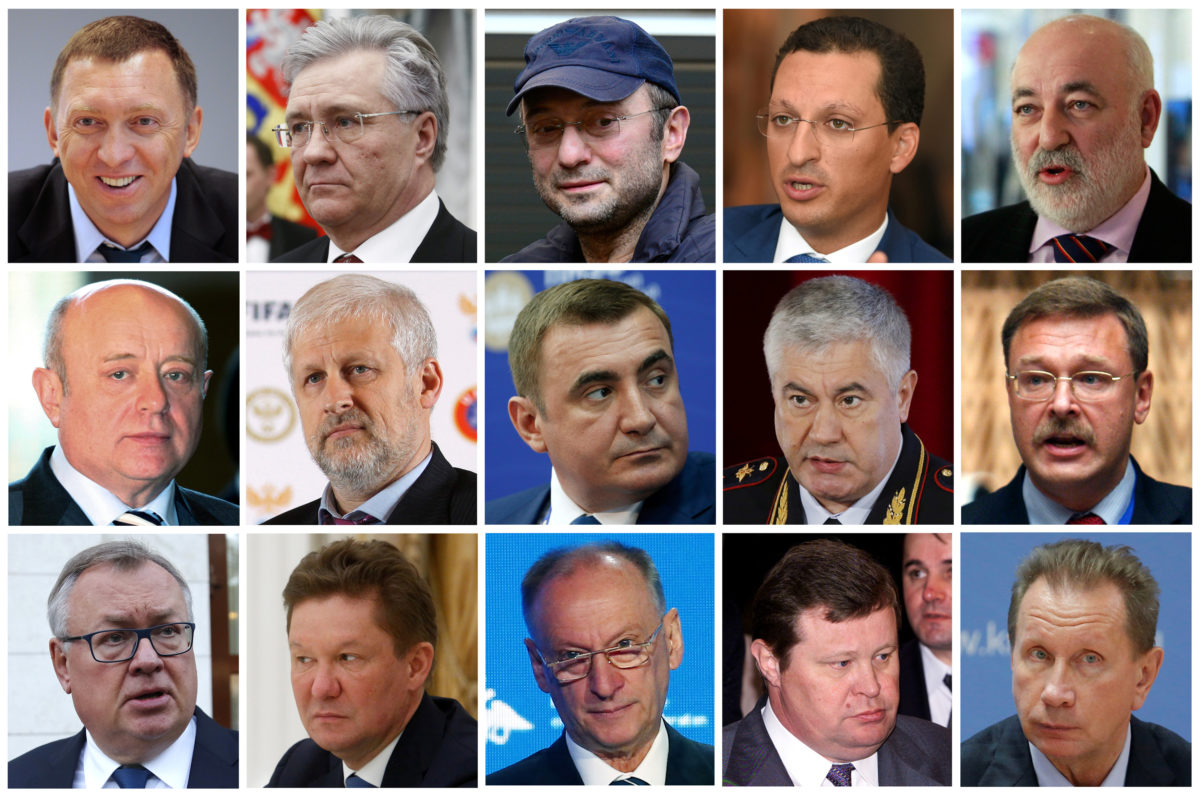 Russian billionaires sanctioned by the U.S. Treasury.The U.S. Department of Treasury announced new sanctions against 17 senior Russian government officials, 7 Russian billionaires and the 12 companies the oligarchs own or control.The Russian government engages in a range of malign activity around the globe, including continuing to occupy Crimea and instigate violence in eastern Ukraine.
Russian billionaires sanctioned by the U.S. Treasury.The U.S. Department of Treasury announced new sanctions against 17 senior Russian government officials, 7 Russian billionaires and the 12 companies the oligarchs own or control.The Russian government engages in a range of malign activity around the globe, including continuing to occupy Crimea and instigate violence in eastern Ukraine.
Former Malaysian leader Mahathir Mohamad’s money-laundering operation.The 480 companies are not successful and are not giving Mahathir and his family money. In fact, it is the other way around. Mahathir is giving these 480 companies money instead. Those 480 companies are being propped up as fronts to help launder money so that Mahathir and his family can spend the money and live like kings without attracting any questions or raise any eyebrows as to where this money came from.And then we have Mahathir and his children Mukhriz, Mokhzani, Mirzan and Marina. Combined they control 480 companies and is definitely a billionaire family. And the impression they create is that they are very successful business people and that they became billionaires because of their 480 companies.This is actually a fallacy plus a great lie. The Mahathir clan may be a billionaire family but they became billionaires not because of their successful businesses or 480 companies. In fact, most of their companies are not really doing well and on their own would have collapsed long ago.Mystery Malaysian high roller at center of global money-laundering probe.The son of a rich Malaysian businessman, he attended the Wharton School and became a financial consultant. One of his clients was Terengganu, an oil-rich sultanate of Malaysia, which in 2008 set up a sovereign wealth fund called TIA.One of Low’s friends from boarding school in London was Riza Aziz. In April 2009, Aziz’s stepfather, Najib Razak, became prime minister of Malaysia.According to an online investigative outlet, the Sarawak Report, it was Low who helped orchestrate Razak’s takeover of TIA. The fund was transformed into 1Malaysia Development Berhad, otherwise known as 1MDB. Razak was made head of its advisory board.The stated purpose of 1MDB was to raise money through bond sales cash it would use for infrastructure projects in Malaysia or to launch joint ventures with Middle Eastern entities. It would earn enough to benefit the country, while giving the bond holders a reasonable rate of return.As advisers to 1MDB and Razak, Goldman Sachs benefited greatly. There were three bond sales for 1MDB in 2012-13 totaling about $6.5 billion, reportedly yielding fees, commissions and expenses for Goldman of almost $593 million about 9.1 percent. The typical cut for an investment bank is about 5 percent.First, the fund missed a payment on the $11 billion it owed to creditors. Then, in July, the Wall Street Journal reported that about $681 million from 1MDB ended up in the prime minister’s private bank account. Razak denied the money came from 1MDB.There were calls for Razak’s resignation, which he has ignored, as Malaysian officials and the US Justice Department along with Switzerland, Singapore and Hong Kong have launched investigations into possible corruption.To start off, Mahathir’s children are not really that smart. Those who know them personally will tell you that Mahathir’s children are quite ‘slow’. The more unkind critics say that Mahathir’s children are actually idiots. They may own 480 companies but that is only because their name is Mahathir and for no other reason. Without the Mahathir name they would probably just be junior executives working for others.The even more important question is are they billionaires because of their successful businesses and their 480 companies or is it the other way around? In other words, are their 480 companies giving them plenty of money or are they giving their 480 companies money instead?Yes, as Honoré de Balzac said, “Behind every great fortune lies a great crime.” Mahathir and his children need to explain where their great wealth came from if not from a great crime. And the way they spend there is no denying that they have great wealth at their disposa.And that is why Mahathir is upset with the PPBM youth movement or the Exco Armada for questioning his and his family’s wealth. In the past no one questioned these 480 companies or suggested that they are fronts for hiding and laundering the wealth that Mahathir stole from the nation.With the RCI on the Bank Negara forex losses about to start, this may trigger an investigation into how much of Bank Negara’s so-called forex losses was not really lost on the market but was actually stolen. And this may force the MACC to step in to investigate the source of Mahathir’s wealth. Worse still, the government may confiscate all this wealth and return it to the country: which is a fate worse than death as far as Mahathir is concerned.
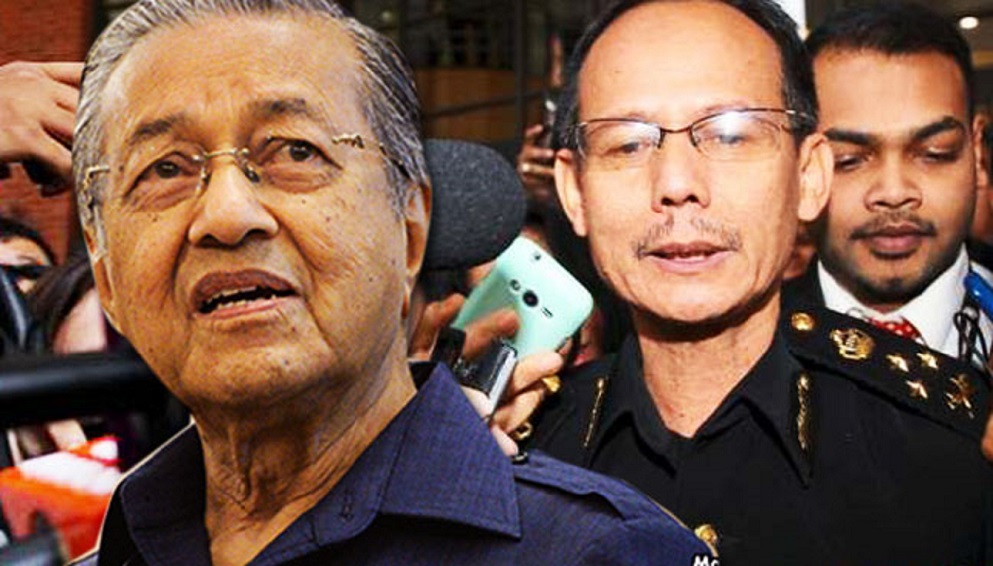 Mahathir and his children — Mukhriz, Mokhzani, Mirzan and Marina. Combined they control 480 companies and is definitely a billionaire family. And the impression they create is that they are very successful business people and that they became billionaires because of their 480 companies.
Mahathir and his children — Mukhriz, Mokhzani, Mirzan and Marina. Combined they control 480 companies and is definitely a billionaire family. And the impression they create is that they are very successful business people and that they became billionaires because of their 480 companies.
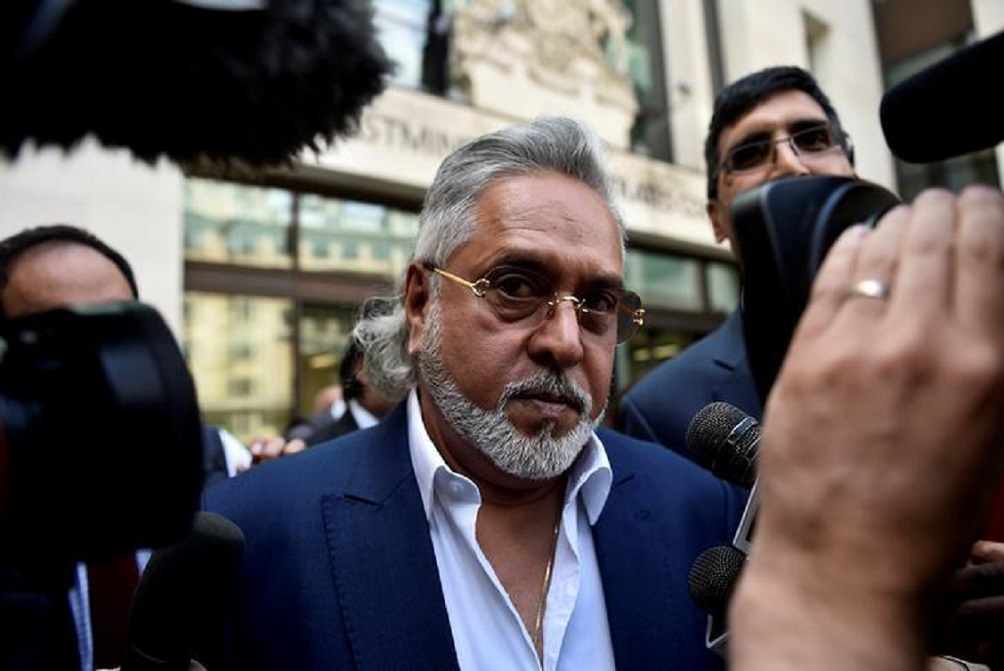 India Asks U.K. To Hand Over Ex-Billionaire Vijay 'Panama Papers' Mallya.Once one of India's most famous business leaders, Mallya's bankrupt Kingfisher Airline made him infamous and now many in the country are calling for his arrest. The government is calling on him to leave his mansion in London and discuss billions in defaulted airline loans with creditors, namely the State Bank of India. The External Affairs Ministry confirmed sending the request to the High Commission of U.K. in Delhi asking for his deportation to India.
India Asks U.K. To Hand Over Ex-Billionaire Vijay 'Panama Papers' Mallya.Once one of India's most famous business leaders, Mallya's bankrupt Kingfisher Airline made him infamous and now many in the country are calling for his arrest. The government is calling on him to leave his mansion in London and discuss billions in defaulted airline loans with creditors, namely the State Bank of India. The External Affairs Ministry confirmed sending the request to the High Commission of U.K. in Delhi asking for his deportation to India.
